Related Research Articles

East Turkestan or East Turkistan, also called Uyghuristan, is a loosely-defined geographical region in the northwestern part of the People's Republic of China, on the cross roads of East and Central Asia. The term was coined in the 19th century by Russian Turkologists, including Nikita Bichurin, who intended the name to replace the common Western term for the region, "Chinese Turkestan", which referred to the Tarim Basin in Southern Xinjiang or Xinjiang as a whole during the Qing dynasty. Beginning in the 17th century, Altishahr, which means "Six Cities" in Uyghur, became the Uyghur name for the Tarim Basin. Uyghurs also called the Tarim Basin "Yettishar," which means "Seven Cities," and even "Sekkizshahr", which means "Eight Cities" in Uyghur. Chinese dynasties from the Han dynasty to the Tang dynasty had called an overlapping area the "Western Regions".
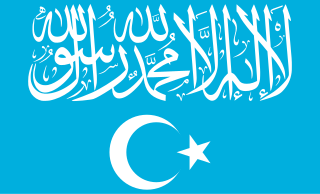
The Turkistan Islamic Party (TIP) is a Uyghur Islamic militant organization founded in Pakistan by Hasan Mahsum. Its stated goals are to establish an Islamic state in Xinjiang and Central Asia.

The East Turkestan independence movement is a political movement that seeks the independence of East Turkestan, a large and sparsely-populated region in northwest China, as a nation state for the Uyghur people. The region is currently administered by the People's Republic of China (PRC) in the Xinjiang Uygur Autonomous Region (XUAR). Within the movement, there is widespread support for the region to be renamed, since "Xinjiang" is seen by independence activists as a colonial name. "East Turkestan" is the best-known proposed name as it is the historical geographic name of the region and the name of the two independent states that briefly existed in the region in the first half of the 20th century.

The East Turkestan Republic (ETR) was a satellite state of the Soviet Union in northern Xinjiang that existed from 1944 to 1946. It is often described as the Second East Turkestan Republic to differentiate it from the First East Turkestan Republic (1933–1934), but "second" was never a part of its official name.

The Darunta training camp(also transliterated as Derunta) was one of the most well-known of many military training camps that have been alleged to have been affiliated with al Qaeda.
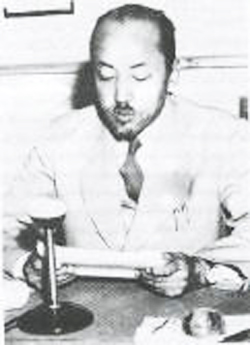
Muhammad Amin Bughra, sometimes known by his Han name Mao Deming and his Turkish name Mehmet Emin Buğra (1901–1965), was a Uyghur Muslim leader who planned to set up a sovereign state, the First East Turkestan Republic. Muhammad Amin Bughra was a Jadidist.

The 1996–2001 Afghan Civil War, also known as the Third Afghan Civil War, took place between the Taliban's conquest of Kabul and their establishing of the Islamic Emirate of Afghanistan on 27 September 1996, and the US and UK invasion of Afghanistan on 7 October 2001: a period that was part of the Afghan Civil War that had started in 1989, and also part of the war in Afghanistan that had started in 1978.

Hasan Mahsum, also known as Abu-Muhammad al-Turkestani and Ashan Sumut, was an Uyghur militant who was the leader of the Turkistan Islamic Party, an Islamic extremist group suspected of having ties with Al Qaeda. He was shot dead in a counter-terrorism operation on October 2, 2003 by the Pakistani Army.
Terrorism in China refers to the use of terrorism to cause a political or ideological change in the People's Republic of China. The definition of terrorism differs among scholars, between international and national bodies, and across time—there is no internationally legally binding definition. In the cultural setting of China, the term is relatively new and ambiguous.
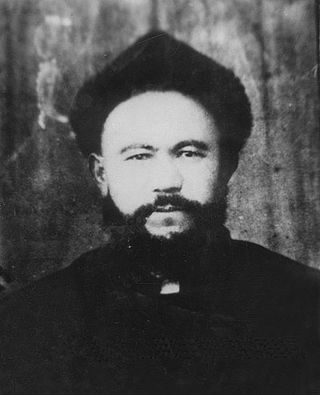
Sabit Damolla was an East Turkestan independence movement leader who led the Hotan rebellion against the Xinjiang Province government of Jin Shuren and later the Uyghur leader Khoja Niyaz. He is widely known as the first and only prime minister of the short-lived Turkic Islamic Republic of East Turkestan from November 12, 1933, until the republic's defeat in May 1934.
Abdul Rasul is a citizen of Pakistan of Uyghur origin, who served as leader of an expatriate group, the Asian Muslims Human Rights Bureau. He is reported to have gone into exile in Pakistan in 1967. Little else is known about him.
Uyghurs in Pakistan are a small community of ethnic Uyghurs who live in Pakistan that originate from Xinjiang, China.
The New 36th Division was a cavalry division in the National Revolutionary Army. It was created in 1932 by the Kuomintang for General Ma Zhongying, who was also its first commander. It was made almost entirely out of Hui Muslim troops, all of its officers were Hui, with a few thousand Uighurs forced conscripts in the rank and file. It was commonly referred to as the "KMT 36th Division", or "Tungan 36th Division".
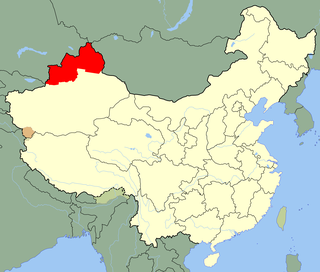
The Ili Rebellion was a separatist uprising by the Turkic peoples of northern Xinjiang against the Kuomintang government of the Republic of China, from 1944 to 1946. The Ili Rebellion began with the East Turkestan National Revolution, known in Chinese historiography as the Three Districts Revolution, which saw the establishment of the Second East Turkestan Republic. The leadership was dominated by Uyghurs but the population consisted mostly of Kazakhs.

In 1937 an Islamic rebellion began in southern Xinjiang. The rebels were 1,500 Uighur Muslims commanded by Kichik Akhund, who was tacitly aided by the New 36th Division, against the pro-Soviet provincial forces of the puppet Sheng Shicai.

The Kumul Rebellion was a rebellion of Kumulik Uyghurs from 1931 to 1934 who conspired with Hui Chinese Muslim General Ma Zhongying to overthrow Jin Shuren, governor of Xinjiang. The Kumul Uyghurs were loyalists of the Kumul Khanate and wanted to restore the heir to the Khanate and overthrow Jin. The Kuomintang wanted Jin removed because of his ties to the Soviet Union, so it approved of the operation while pretending to acknowledge Jin as governor. The rebellion then catapulted into large-scale fighting as Khotanlik Uyghur rebels in southern Xinjiang started a separate rebellion for independence in collusion with Kirghiz rebels. The various groups of rebels were not united. The main part of the war was waged by Ma Zhongying against the Xinjiang government. He was supported by Chiang Kai-shek, the Premier of China, who secretly agreed to let Ma seize Xinjiang.
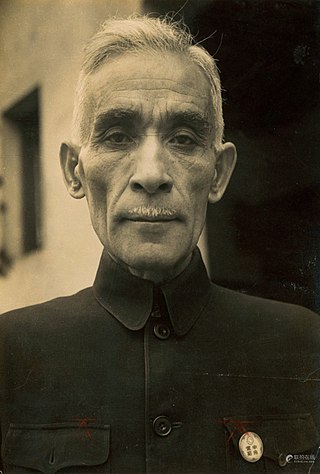
Masud Sabri, also known as Masʿūd Ṣabrī, was an ethnic Uyghur politician of the Republic of China who served as the governor of Xinjiang during the Ili Rebellion. He received education at Kulja and Istanbul and was a Pan-Turkist. Chiang Kai-shek appointed him the first Uyghur governor of Xinjiang.
Abdul Rasul is an Arabic male given name, meaning servant of the prophet.
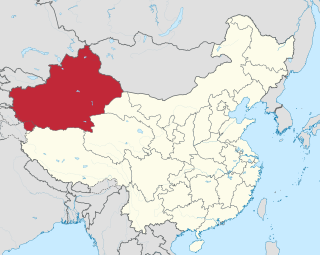
The Xinjiang conflict, also known as the East Turkistan conflict, Uyghur–Chinese conflict or Sino-East Turkistan conflict, is an ethnic geopolitical conflict in what is now China's far-northwest autonomous region of Xinjiang, also known as East Turkistan. It is centred around the Uyghurs, a Turkic ethnic group who constitute a plurality of the region's population.

Xinjiang Province or Sinkiang Province was a nominal province of the Republic of China without administrative function. First set up as a province in 1884 by the Qing dynasty, it was replaced in 1955 by the Xinjiang Uygur Autonomous Region of the People's Republic of China. The original provincial government was relocated to Taipei as the Sinkiang Provincial Government Office (新疆省政府辦事處) until its dissolution in 1992.
References
- ↑ B. Raman (1998-12-22). "OSAMA BIN LADEN: RUMBLINGS IN AFGHANISTAN". South Asia Analysis Group. Archived from the original on June 13, 2010. Retrieved 2009-06-26.
The other is the Asian Muslims Human Rights Bureau headed by Abdul Rasul, a Pakistani citizen of Xinjiang origin, which has been campaigning for an independent Eastern Turkestan. In an interview to the "Nation" (November 7, 1998), Abdul Rasul, an Uighur, claimed that he had met Bin Laden who had promised all support to the Muslims of China in their jihad against Beijing.
- ↑ B L Kak (1999-04-15). "Sino-Taliban nexus is ominous for India". Daily Excelsior . Retrieved 2009-06-26.
The Hizbul Mujahideen, a Pakistan-based outfit operates mostly in Jammu and Kashmir. Some of these Uygurs, intelligence reports have confirmed, are also getting their religious education in the seminaries of Pakistan and Egypt. At the same time, media reports have made a pointed reference to yet another significant aspect of the situation: Pakistan-based sponsor of Eastern Turkestan movement and president of the Asian Muslims Human Rights Bureau, Mr Abdul Rasul, met Osama Bin Laden in Khost province of Afghanistan in the first week of October 1998. Osama had promised to help the Muslims of China.
[ permanent dead link ] - ↑ "CHINA'S SUPPORTIVE STANCE ON KARGIL". Kashmir Sentinel. August 1999. Retrieved 2009-06-26.
Pakistan has been patronising Islamic fundamentalists to create trouble in Sinkiang. The Front organisation of Sinkiang Muslims "Asian Muslims Human Rights Bureau" operates from Islamabad. Pakistan press reports regularly highlight how Sinkiang Muslims pursue their objectives of achieving separate homeland.